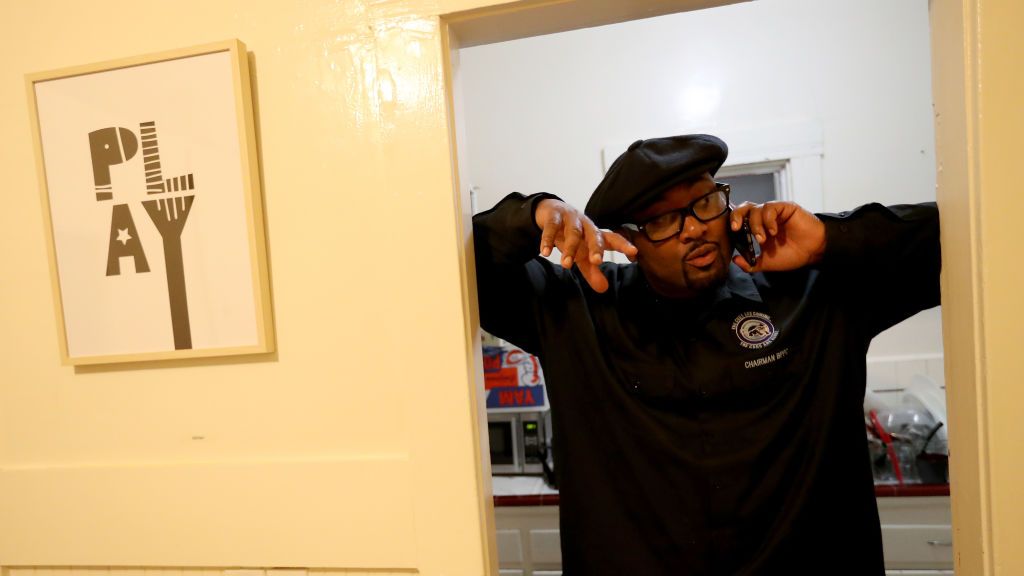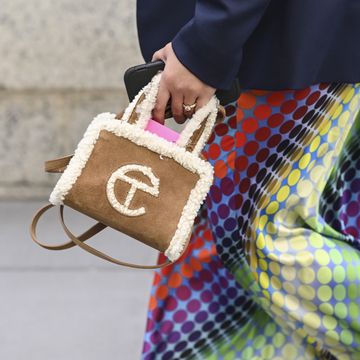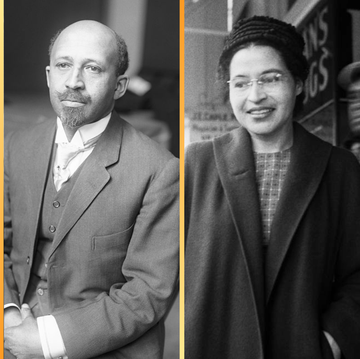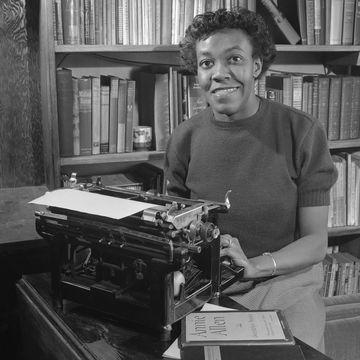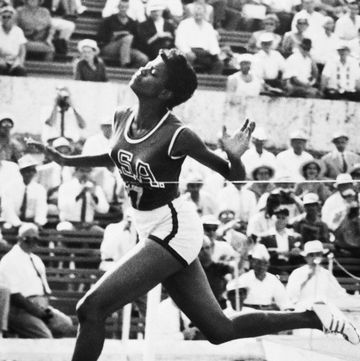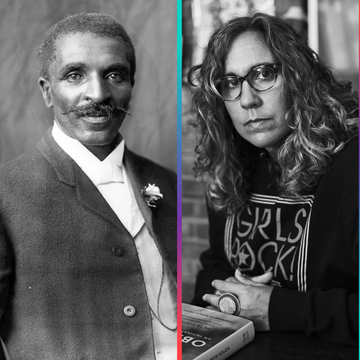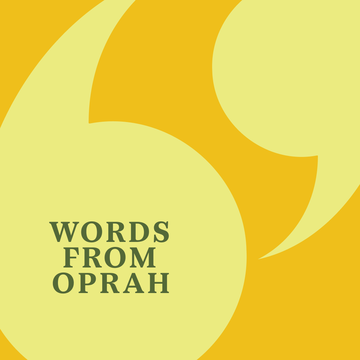- Fred Hampton Jr., the son of deceased Black Panther Party Chairman Fred Hampton, has followed in his father's footsteps as a vocal activist.
- Hampton Jr. consulted on HBO's new movie, Judas and the Black Messiah, which features Daniel Kaluuya playing his father.
- Now 51, Hampton Jr. is active as Chairman of the Black Panther Party Cubs.
From the day he was born, less than a month after his father's death, Fred Hampton Jr. was immersed in Black revolutionary politics. The son of Black Panther Party Illinois Chairman Fred Hampton, who was killed by police during a raid on December 4, 1969, Hampton Jr. has continued his family's legacy of working both within the Black Panther infrastructure and through other organizations to further causes related to racial and social justice.
Though Hampton Jr. is not depicted in the new Shaka King biopic of his father, Judas and the Black Messiah, he and his mother, Akua Njeri, played an important role in shaping the movie as consultants on set. Hampton Sr. is portrayed by Get Out's Daniel Kaluuya, while The Deuce's Dominique Fishback plays Njeri, who then went by Deborah Johnson, in the movie that comes to HBO Max on February 12, 2021.
Per the Chicago Sun-Times, Hampton Jr. had opted out of being involved in similar movies over the years, and his stipulation for Judas and the Black Messiah was that members of the project, including Kaluuya and Fishback, meet with him at some of the important locations in his father's life.
"He is his father’s son,” King told the Sun-Times. “Fred Jr.’s time on set with us was incredibly useful. We redid scenes, and he pointed out minor details. We’re doing a movie about these people’s lives; we had to get it right.”
Today, Hampton Jr. continues to shed light on issues that have plagued the Black community for centuries, and he makes a point of connecting his own struggle to that of his father, in addition to the history of slavery in America.
"We’re not the OGs, we’re OVs of terrorism—the original victims. Although the terms may change, it may be slavery, Jim Crow, police brutality, once we start connecting up with each other at some points of unity with this struggle, and just even the conversation happening, we’ll be connected and can’t no chains, no shackles, no water, no land or language barriers divide us," Hampton Jr. told The Undefeated in February 2020.
Here's what you need to know about the life of Fred Hampton Jr., and where he is now.
Fred Hampton Jr. grew up on Chicago's South Side in the 1970s.
Born less than four weeks after his father's murder, Hampton Jr. was initially named Alfred Johnson. His mother changed it at age 10, per a 1998 Chicago Reader feature. According to that piece, Hampton was immersed in Black activist ideas and philosophy from a young age.
"The first movie he remembers was the 1970 documentary The Murder of Fred Hampton," Adam Langer wrote. "His first memory of his father is of seeing a 'Big Fred' poster at a rally for Huey Newton and being so scared that he jumped into his mother's arms."
His mother told the Reader that classmates and teachers of his would disparage Hampton Sr. and the Panthers, prompting Hampton Jr. to dive deep into books about the group's actual history, and talk candidly about his father with Njeri.
"My mother always told me about Fred Hampton...I knew he was a courageous brother fighting for liberation of our people and colonized people in general," Hampton Jr. said. "I respected and loved my father, but I wasn't able to grasp in its entire context, the work that Fred Hampton did, why he was targeted and who targeted him."
Hampton Jr. attended schools in the Chicago area, ultimately studying journalism at Olive-Harvey college. Throughout that time, he was involved with the National People's Democratic Uhuru Movement (NPDUM), and helped organize protests. All the while, he continued to champion the legacy of his father, who he refers to by his full name and title with the Panthers.
"I've been asked a number of times, 'Why do you always reference, you know, your father as Chairman Fred?' And my response is that Chairman Fred does not negate him from being my father or [Akua Njeri's] husband," he told Entertainment Tonight. "This was a representative of our people, and I don't see it subjectively. This was a major hit to our Black community, in particular, but humanity in general."
At 23, he was found guilty of "aggravated arson" and served time in prison.
In 1993, a then 23-year-old Hampton Jr. was found guilty of arson by a Cook County Circuit Judge and sentenced to 18 years of prison time, per The Chicago Tribune. The charge stemmed from an incident where Hampton Jr. is said to have thrown a molotov cocktail into a local Korean business as part of protests connected to the Rodney King verdict, which led to outrage around the country.
According to the Reader, Hampton Jr. maintained his innocence throughout the trial. While he was serving time, Hampton Jr. and his mother asserted that he was being "targeted" because of his father and his family's connection to the Black Panthers.
"I am a victim of continued counterinsurgency. A lot of people think counterinsurgency was solved in 1972. I was targeted since I was born," he said. "Still, in the eyes of the state, being the son of Fred Hampton is a crime."
There was an appeal for clemency in 2001, and some online sources say he was paroled that same year.
Hampton Jr. serves as the Chairman of the Black Panther Party Cubs.
Just like his father became a crucial member of the Black Panthers, Hampton Jr. is Chairman of the Black Panther Party Cubs organization.
The exact definition of the Black Panther Cubs is a bit murky, but according to a piece by fellow Cub Malkia Cyril in Al Jazeera, they are made up of children of Panther members who are involved in similar causes as their parents. Hampton Jr. has echoed that message in interviews.
"The organization that I'm honored to represent, the Black Panther Party Cubs, [believes] a legacy is more important than your life," he told Entertainment Tonight. "...And the legacy of such a force of Chairman Fred and the Black Panther Party in general, we hold it tight."
Akua Njeri, Hampton Jr.'s mother, remains an influential activist and public figure.
Fred Hampton Jr.'s commitment to revolutionary politics and practice is also due in large part to his mother, who was asleep next to her then-fiancé, Hampton Sr., when the deadly police raid took place.
In 1991, Njeri published My Life With the Black Panther Party, and has continued to speak out about her experience that night. She gave a harrowing account to ABC News on the 50th anniversary of Hampton's killing.
"When I was handcuffed the police said, ‘You better not run, you better not try to escape’ and he kept pressing that gun to my belly,” she said. “So my child felt that cold steel.”
Njeri continues to be involved with Black social causes around Chicago, often appearing in public with Hampton Jr., who has spoken about how important she's been to his life.
"I feel fortunate to fall from the tree of two freedom fighters: Chairman Fred Hampton and also Akua Njeri, formerly known as Deborah Johnson," Hampton Jr. said in a video posted on December 4, 2020.
Hampton Jr. uses Instagram to help champion the causes he supports.
Like so many modern activists, Fred Hampton Jr. has incorporated social media into his practices. He is most active on Instagram and Twitter, where he shares updates on his activity, including recent appearances in Kenosha, WI to protest the police shooting of Jacob Blake and his annual visit to his father's gravesite in Haynesville, LA.
"The Black Panther Party says, 'Differences among the people are reconcilable,'" he said in Kenosha. "However, differences between the people and the state are irreconcilable."
He is helping run a GoFundMe to purchase and restore the home where his father grew up.
Thus far, Hampton Jr. has raised more than $200,000 of a $350,000 goal to purchase and restore his father's childhood home in Chicago.
"We are seeking landmark status for the home and plan to establish it as a museum," the GoFundMe's vision statement reads. "We are also facilitating educational services, community gardens, and a meeting place for community development."
The house is located in the working class suburb of Maywood, and was the place where Hampton Sr. first became involved in activism. Per South Side Weekly, he led the student chapter of the local NAACP, and not long after became involved in putting together the influential "rainbow coalition," which featured people of all different races working together for social progress, and provided free breakfasts to local schools, according to South Side Weekly.
"We're fighting for a place where certain discussion [can be put] in real, historical context," Hampton Jr. said of his father's home.
Before Judas and the Black Messiah, Hampton Jr. had been connected to the worlds of music and film.
In particular, many hip-hop artists have met with and supported Hampton Jr. to further the cause of Black equality. M1 of the political rap group Dead Prez traveled with Hampton Jr. in the early 2000s, per The Chicago Tribune, while the Black Panther Cubs leader has also been photographed meeting with the late Nipsey Hussle.
Hampton Jr. also appeared in the 2005 movie Dave Chappelle's Block Party, and the 1988 Morley Markson documentary Growing Up in America, which focuses on crucial figures in '60s radical politics such as Hampton Sr., Allen Ginsberg, and Abbie Hoffman.
For ways to live your best life plus all things Oprah, sign up for our newsletter!
